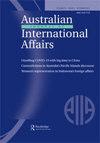One year on from the Taliban takeover of Afghanistan: re-instituting gender apartheid
IF 1.8
3区 社会学
Q2 INTERNATIONAL RELATIONS
引用次数: 7
Abstract
ABSTRACT One year on from the Taliban’s takeover, what has changed in Afghanistan? Why has re-instituting a gender apartheid regime been so central to the Taliban 2.0’s (Taliban 2.0 refers to the second version of the Taliban that came to power in August 2021. The first Taliban rule were from 1996 to 2001.) consolidation of power in Afghanistan since August 2021? We address these questions by explaining how gender has become a salient feature of multi-level power struggles in Taliban-ruled Afghanistan. First, we examine the changes experienced by women and girls over the past year under the second Taliban regime. Second, we consider four types of power struggles—in international relations, in transnational politics, within the Taliban organisation, and between Afghan men and women—that constrain the realisation of women’s rights and security. Finally, we suggest politically necessary actions for Australian Government to support the women and girls of Afghanistan in line with its value-based foreign policy and multilateral commitments.塔利班接管阿富汗一年后:重新实行性别隔离
塔利班掌权一年后,阿富汗发生了什么变化?为什么重新建立性别隔离制度对塔利班2.0如此重要(塔利班2.0指的是2021年8月上台的塔利班的第二个版本)?第一次塔利班统治是从1996年到2001年。我们通过解释性别如何成为塔利班统治下的阿富汗多层次权力斗争的一个显著特征来解决这些问题。首先,我们考察了妇女和女孩在过去一年中在第二个塔利班政权下所经历的变化。其次,我们考虑了四种类型的权力斗争——在国际关系中,在跨国政治中,在塔利班组织内部,以及在阿富汗男人和女人之间——它们限制了妇女权利和安全的实现。最后,我们建议澳大利亚政府采取政治上必要的行动,根据其基于价值的外交政策和多边承诺,支持阿富汗的妇女和女孩。
本文章由计算机程序翻译,如有差异,请以英文原文为准。
求助全文
约1分钟内获得全文
求助全文
来源期刊

Australian Journal of International Affairs
INTERNATIONAL RELATIONS-
CiteScore
3.20
自引率
13.30%
发文量
44
期刊介绍:
AJIA is the journal of the Australian Institute of International Affairs. The Institute was established in 1933 as an independent and non-political body and its purpose is to stimulate interest in and understanding of international affairs among its members and the general public. The aim of the Australian Journal of International Affairs is to publish high quality scholarly research on international political, social, economic and legal issues, especially (but not exclusively) within the Asia-Pacific region. The journal publishes research articles, refereed review essays and commentary and provocation pieces. ''Articles'' are traditional scholarly articles. ‘Review essays’ use newly published books as the basis to thematically examine current events in International Relations. The journal also publishes commentaries and provocations which are high quality and engaging pieces of commentary, opinion and provocation in a variety of styles. The Australian Journal of International Affairs aims to analyse international issues for an Australian readership and to present Australian perspectives to readers in other countries. While seeking to stimulate interest in and understanding of international affairs, the journal does not seek to promote any particular policies or approaches. All suitable manuscripts submitted are sent to two referees in a full ''double blind'' refereeing process.
 求助内容:
求助内容: 应助结果提醒方式:
应助结果提醒方式:


